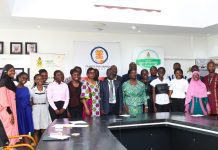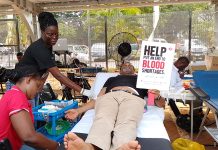In 2017, when Audrey S-Darko started her company, Sabon Sake, it was not because of a dream she had nurtured from infancy, neither was it the product of sleepless nights thinking of a solution to a problem, nor a crowd-sourced idea that bore fruit at the right time. You could say it was simply serendipity.
The Oxford Dictionary defines serendipity as “the occurrence and development of events by chance in a happy or beneficial way”. Although this definition may be the most relatable, there was nothing lucky about how Sabon Sake started.
Sabon Sake which means “to transform” in Hausa is more than an agricultural company. If you call it a movement, you wouldn’t be wrong. Audrey describes what her company does as “enabling the regeneration of our most valuable assets – soils and communities – by working closely with nature and clean technology to enable ecosystems to function at optimum best and address climate change, one rural farming community at a time”.
Because of what she does, Audrey has been part of a journey that we at Standard Chartered Ghana are extremely proud of. A journey of uplifting, scaling, and expanding the participation of she and hundreds of women in technology within the Ghanaian economy.
Why Women in Technology matter to us
At Standard Chartered we are committed to working together for sustainable prosperity that benefits everyone for the long-term. That is core to our purpose of driving commerce and prosperity through our unique diversity and gives us the perspective to look beyond the obvious and challenge what stands in the way of commerce and prosperity. We aim to deliver sustainable prosperity in line with our brand promise to be Here for good which permeates every sector of the economy. It is our pledge to leave the world much better than we found it.
We are committed to sharing our skills and expertise and developing community programmes that transform lives. Through our Futuremakers programme we are removing the barriers to opportunity that face young people and women in our communities. One of such is our Women in Technology Incubator programme which supports female entrepreneurial teams with business management training, mentoring and seed funding.
According to a 2017 UNESCO report, only 35% of STEM students in higher education globally are women. The situation is worse in middle- and lower-income economies and even more worrying because only 3% of female students in higher education opt for ICT studies. This means that as at 2018, women held 24% of all jobs in the digital economy and the statistics have not changed today. Our intervention is therefore timely and relevant.
In its inaugural cycle, funding of up to USD50,000 was given out to five women-led entrepreneurial ventures that leveraged technology to bring change. In its second cycle, the SC Women in Technology Incubator Programme has currently enrolled 20 female-owned businesses who are blazing trails in different areas of enterprise. Through the business network and mentoring support, these female entrepreneurs can connect, collaborate, and consult with peers and seasoned businesswomen.
Support from the Incubator which includes grants for the top five cohort finalist as well as access to portfolio managers, serves as a launchpad for these entrepreneurs to take their businesses to the next level. For Audrey of Sabon Sake, one of the finalists in her cohort, these came in handy.
When I recently met with Audrey, she underscored how the opportunity to engage actively and interact with amazing female entrepreneurs who were in the programme was extremely rewarding. “I got to learn how we were excelling in our different worlds and how we could help each other as entrepreneurs. Being able to build synergy and networks during and after the programme was the best thing I took away” Audrey further noted.
Our long-term ambitions to address societal challenges
The world as we know it today is grappling with the severe impact of climate change, plain inequality, and unfair aspects of globalisation. No one is being spared and as a bank, we have taken stands that defines our ambition to play a role in addressing these societal issues. These are accelerating zero, lifting participation, and resetting globalisation. These stands are not philanthropy. They are derived from and driven by strategy, ensuring commercial growth with long-term goals.
Accelerating Zero
As companies around the world strive to achieve net-zero carbon emissions by 2050, we are contributing our quota to reduce emissions, catalyse finance and partnerships, and accelerate new solutions. We are providing the advisory services and financing that our clients need to complete their own journeys.
Lifting Participation
Communities are at the heart of our operations. Inequality, along with gaps in economic inclusion, means that many young people, women, and small businesses struggle to gain access to the financial system to save for their futures and grow their businesses. We believe in making financing available to the very people who can make a difference. Through partnerships and technology, we will expand the reach and scale of financial services – driving accessible banking at scale and connecting clients to opportunities that promote access to finance and economic inclusion.
Resetting Globalisation
Globalisation has lifted millions out of poverty, but too many people have been left behind. Division and inequality have grown, along with negative impacts on our planet. As a leading Trade bank, we strive to connect the capital, expertise and ideas needed to drive new standards especially through supply chains and create innovative solutions for more equitable and sustainable growth.
Lifting women’s participation during IWD month and beyond
As a Bank, we are taking action to ensure equal access to financial support for women and small businesses across Ghana. We want to improve the lives of our communities and one sure way is by unleashing the financial potential of women and small businesses.
Therefore, as we wrap up Women’s Month 2022, I am proud to lead an organisation that is committed to increased participation by women. Earlier this month we rolled out Lift by Standard Chartered which is our proposition for female-owned businesses.
This coupled with many other initiatives such as the Girls in vocational skills training and the Women in Technology Incubator Programme, by the bank and its partners, we are being intentional about closing the gap where female entrepreneurship is concerned.
We are encouraged by Audrey and Sabon Sake and look forward to many more who will follow in her footsteps.













































